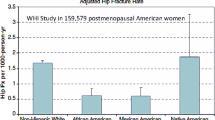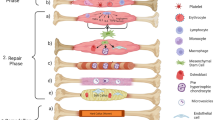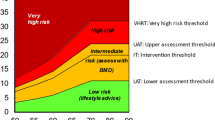Abstract
Effective therapies for the treatment of osteoporosis and fracture have been available for a number of years. Despite this, there are numerous reports indicating very low uptake rates in those admitted to hospital with fracture. The aim of this retrospective audit was to assess the impact of a fracture protocol on inpatient prescriptions of osteoporosis therapy. A fracture protocol was arrived at by consensus and was based on recommendations from the Australian Fracture Prevention Summit, which included specific advice on the commencement in hospital of calcium, vitamin D, synthetic estrogen receptor modulators (SERMs) and bisphosphonates. We studied subjects who were treated for fractured neck of the femur at Royal Hobart Hospital from March 2002 to March 2004 and included 161 prior to the start of the protocol and 93 after. As compared to the baseline period, subjects after the introduction of the protocol had higher rates of in-hospital prescription for any treatment (58 vs. 36%, P <0.01), calcium (51 vs. 26%, P <0.01), vitamin D (48 vs. 29%, P <0.01) and oral bisphosphonates (24 vs. 5%, P <0.01), but not SERMs as expected (1 vs. 1%, P =0.70). Additional factors affecting the decision to start any treatment included in-hospital death (OR 0.16, 95% CI 0.05–0.49), dementia (OR 0.39, 95% CI 0.21–0.74), a trend for female sex (OR 1.79, 95%CI 0.96–3.36), but not age. In conclusion, a structural approach to changing hospital policy from the top down is effective at substantially increasing the usage of effective therapy after fractured neck of the femur.

Similar content being viewed by others
References
Cooley H, Jones G. A Population Based Study of Fracture Incidence in Southern Tasmania: Lifetime Fracture Risk and Evidence for Geographic Variations within the Same Country. Osteoporos Int 2001 12:124–30
Black DM, Cummings SR, Karpf DB et al. Randomised trial of effect of alendronate on risk of fracture in women with existing vertebral fractures. Fracture Intervention Trial Research Group. Lancet.1996 348:1535–41
Ettinger B, Black DM, Mitlak BH et al. Reduction of vertebral fracture risk in postmenopausal women with osteoporosis treated with raloxifene: results from a 3-year randomized clinical trial. Multiple Outcomes of Raloxifene Evaluation (MORE) Investigators. JAMA. 1999 282:637–45
Olszynski WP, Davison S, Adachi JD et al. Osteoporosis in men: epidemiology, diagnosis, prevention, and treatment. Clin Ther. 2004 26:15–28.
Klotzbuecher CM, Ross PD, Landsman PB, Abbott TA 3rd, Berger M. Patients with prior fractures have an increased risk of future fractures: a summary of the literature and statistical synthesis. J Bone Miner Res. 2000 15:721–39
Sambrook PN, Seeman E, Phillips SR et al. Preventing osteoporosis: outcomes of the Australian Fracture Prevention Summit. Med J Aust 2002 176 Supplement:S1-S16
Solomon DH, Finkelstein JS, Katz JN et al. Underuse of osteoporosis medications in elderly patients with fractures. Am J Med 2003; 115:398–400
Andrade SE, Majumdar SR, Chan KA, et al. Low frequency of treatment of osteoporosis among postmenopausal women following a fracture. Arch Intern Med 2003; 163:2052–7.
Torgerson DJ, Dolan P. Prescribing by general practitioners after an osteoporotic fracture. Ann Rheum Dis. 1998 57:378–9.
Kamel HK, Hussain MS, Tariq S, Perry HM, Morley JE. Failure to diagnose and treat osteoporosis in elderly patients hospitalized with hip fracture. Am J Med. 2000 109:326–8.
Simonelli C, Chen YT, Morancey J, Lewis AF, Abbott TA. Evaluation and management of osteoporosis following hospitalization for low-impact fracture. J Gen Intern Med. 2003 18:17–22
Cuddihy MT, Gabriel SE, Crowson CS et al. Osteoporosis intervention following distal forearm fractures: a missed opportunity? Arch Intern Med. 2002 162:421–6
Hajcsar EE, Hawker G, Bogoch ER. Investigation and treatment of osteoporosis in patients with fragility fractures. CMAJ. 2000 163:819–22.
Wong PK, Spencer DG, McElduff P, Manolios N, Larcos G, Howe GB. Secondary screening for osteoporosis in patients admitted with minimal-trauma fracture to a major teaching hospital. Intern Med J. 2003 33:505–10
Zochling JM, Schwarz JM, March L, Sambrook PN. Is osteoporosis undertreated after minimal trauma fracture? Med J Aust. 2001 174:663–4.
Port L, Center J, Briffa NK, Nguyen T, Cumming R, Eisman J. Osteoporotic fracture: missed opportunity for intervention. Osteoporos Int. 2003 14:780–4
Fisher AA, Davis MW, Budge MM. The management of osteoporosis following hip fracture: how to improve our care. Osteoporos Int. 2004 15:583–4
McClung MR. Current bone mineral density data on bisphosphonates in postmenopausal osteoporosis. Bone. 1996 19(5 Suppl):195S-198S.
Reid IR, Brown JP, Burckhardt P et al. Intravenous zoledronic acid in postmenopausal women with low bone mineral density. N Engl J Med. 2002 346:653–61
Nguyen T, Sambrook P, Kelly PJ et al. Prediction of osteoporotic fractures by postural instability and bone density. BMJ 1993 307:1111–1115.
Cuddihy MT, Amadio PC, Gabriel SE, Pankratz VS, Kurland RL, Melton LJ 3rd. A prospective clinical practice intervention to improve osteoporosis management following distal forearm fracture. Osteoporos Int. 2004 15:695–700
Naunton N, Peterson GM, Jones G, Griffin GM, Bleasel MD. Multi-faceted educational program increases prescribing of preventive medication for corticosteroid-induced osteoporosis. J Rheumatol 2004 31:550–6
Mauck KF, Cuddihy MT, Trousdale RT, Pond GR, Pankratz VS, Melton LJ 3rd.The decision to accept treatment for osteoporosis following hip fracture: exploring the woman’s perspective using a stage-of-change model. Osteoporos Int. 2002 13:560–4.
Feldstein AC, Elmer PJ, Smith DH et al. Results of a randomized controlled trial to improve the management of osteoporosis after fracture. Minneapolis, MN: American Society for Bone and Mineral Research: 2003 meeting; September 19–23, 2003:Abstract SU367.
Himmel W, Tabache M, Kochen MM. What happens to long-term medication when general practice patients are referred to hospital? Eur J Clin Pharmacol. 1996;50:253–7.
Lowe CJ, Raynor DK, Courtney EA, Purvis J, Teale C. Effects of self medication programme on knowledge of drugs and compliance with treatment in elderly patients. BMJ. 1995 310:1229–31
Author information
Authors and Affiliations
Corresponding author
Additional information
There were no sources of support for this article.
Rights and permissions
About this article
Cite this article
Jones, G., Warr, S., Francis, E. et al. The effect of a fracture protocol on hospital prescriptions after minimal trauma fractured neck of the femur: a retrospective audit. Osteoporos Int 16, 1277–1280 (2005). https://doi.org/10.1007/s00198-005-1960-y
Received:
Accepted:
Published:
Issue Date:
DOI: https://doi.org/10.1007/s00198-005-1960-y




